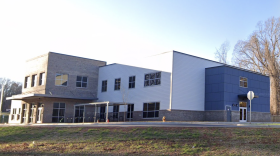For years, advocates of charter schools have pressed legislators to pass a law that would allow more charters to operate in North Carolina. The schools receive public money, but they function independently of local districts. Right now only one hundred of them are allowed to operate at any given time in the state. But the new Republican-controlled legislature is likely to eliminate that limit completely. And that would make some charter school advocates very happy.
Pamela Blizzard is well known across the state as one of the founders of Raleigh Charter High School, considered one of the most successful charters in the region:
"To me, the excitement about this charter legislation is that we may have a new tool in our toolkit to change some things that happen in public education."
Blizzard has long been frustrated by the current cap on charters. After Raleigh Charter became successful, she and others then applied to start an additional school. Their application was denied- competition was fierce for just a few available slots. But Blizzard says if Senate Bill 8 becomes law she’ll try again- and she says others should too.
"We can draw on all the experience of people like me twelve years ago, and people like the Kipp founders, and everybody in between that is doing amazing things all over this country and bring that to North Carolina- we’ve kind of cut ourselves short."
Kipp schools are run by a national non-profit organization with an impressive track record of getting low-income students to college. There are now two Kipp schools in North Carolina. But Republican leaders in the Senate aren’t focused on a particular kind of charter school— they just want more. Senator Richard Stevens of Wake County is the bill’s main sponsor:
"The charter issue is on our sort of top ten list of items we wanted to move in this session."
Many Republicans like charter schools because they say they provide parents with more choice.
"We heard it over and over again from citizens during the last election, I think there’s strong support among the new majority to remove that cap. And I think folks in the minority party now have seen fit to say they would support the raising of the cap."
Democrats are well aware that the bill is likely to pass and so they’re working to get certain amendments added to it. So are traditional public school advocates, including Leanne Winner with the North Carolina School Boards Association.
"We have five or six things that we would like to see addressed that have been problematic over the years, including nutrition, transportation for disadvantaged students, so that they have an opportunity to make that choice if they think it is right for them educationally."
Charter schools are not currently required to provide transportation or subsidized meals for students. The current bill would set up a commission to evaluate charter school applications using a number of criteria. Any decisions made by the commission would automatically go forward unless three-fourths of the members of the State Board of Education disapprove. Meanwhile, education experts are watching the bill’s progress closely:
"Many states have limits on the number of charter schools but many states have lifted those limits over time with mixed results."
Bryan Hassel is with Public Impact, a national education consulting firm based in Chapel Hill. Hassel says Colorado and California have managed to open more high-quality charter schools, but Ohio and Texas expanded too rapidly without screening applicants properly and ended up with a lot of failing charter schools on their hands. Hassel says he hopes that doesn’t happen here in North Carolina.
"Probably ten or fifteen percent of the charters in the country are really knocking it out of the park. And the rest are either pretty similar to the districts, or worse. And so we need to figure out how can we get more of that ten or fifteen percent to grow and expand and grow and serve more kids."
The bill still has to go to at least one more committee meeting before it makes it to the Senate floor.





